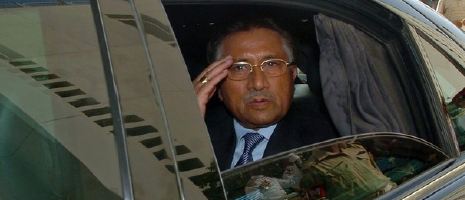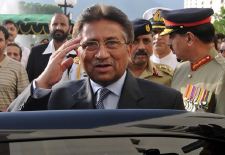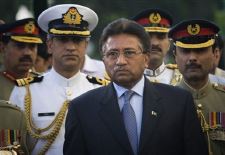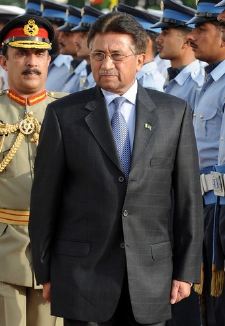Adil Najam
In a nationally televised speech, Gen. Pervez Musharraf, President of Pakistan, has just announced his resignation, pre-empting a move to impeach him by the parliament.
This post has been updated to add news photos from this momentous day in Pakistan’s political history. The pictures speak eloquently of the moods and thoughts of the day. (Scroll down to see the video of Gen. Musharraf’s resignation speech).
Participate in a poll on what might be Pakistan’s future post-Musharraf, here.
![]()
Here is a Pervez Musharraf time-line, published in The News:
August 1943: Born in Delhi, India
1964: Joins Pakistani army.
1998: Becomes army chief of staff.
October 1999: Seizes power in a bloodless military coup, overthrowing the prime minister, Nawaz Sharif. In response, the Commonwealth suspends Pakistan’s membership.
June 20 2001: Makes himself president, replacing Rafiq Tarar, while remaining head of the army. Tarar is forced out of office when the parliament that elected him is dissolved.
July 2001: Holds first meeting with the Indian prime minister, Atal Bihari Vajpayee, at Agra in India. No progress is made because of differences over the disputed territory of Kashmir.
September 2001: George Bush courts Musharraf, asking him to join him in his “war on terror” and help defeat the Taliban in neighbouring Afghanistan. The US president promises Pakistan $1bn in aid.
April 2002: Wins a referendum giving him another five years in office. Observers criticise the referendum as blighted by irregularities.
May 2002: Pakistan test fires three medium-range surface-to-surface missiles capable of carrying nuclear warheads. Musharraf insists his country would not be the one to initiate war.
August 2002: Consolidates his power still further, giving himself the right to dismiss an elected parliament.
October 2002: Pakistan’s first general election since Musharraf seized power in 1999 results in a hung parliament.
November 2002: Mir Zafarullah Jamali becomes the first civilian prime minister since 1999. He is a member of a Musharraf-supporting party.
November 2003: Pakistan’s National Assembly meets for the first time since 1999.
December 2003: Musharraf promises to step down as head of the army by January 2005.
May 2004: Pakistan is readmitted to the Commonwealth.
December 2004: Musharraf announces he will stay on as head of the army.
August 2005: Pakistan tests its first nuclear-capable cruise missile.
March 2007: Musharraf suspends the chief justice, Iftakar Mohammed Chaudhry, triggering a wave of anger across the country and the first joint protests held by the parties of exiled former prime ministers Benazir Bhutto and Nawaz Sharif.
October 2007: Signs a corruption amnesty, opening the way for Bhutto’s return and a possible power-sharing agreement. Within hours of Bhutto’s arrival back in the country, bombers attack a Bhutto rally in Karachi, killing more than 100 people.
November 2007: Declares a state of emergency, rounding up opposition leaders at gunpoint. In the same month, Musharraf quits as head of the army, becoming a civilian president.
December 15 2007: Lifts state of emergency and announces plans to go ahead with parliamentary elections scheduled for January 8.
December 27 2007: Benazir Bhutto is assassinated at an election rally in Rawalpindi.
January 2008: Elections postponed until February 18.
February 2008: The two main opposition parties gain a clear majority in the elections.
August 2008: The two main parties strike a deal to impeach Musharraf if parliament backs the move.
August 18 2008: Musharraf announces his resignation



























































Aamir Ali, Just for the sake of not repeating yourself to death, go read this book, “The Way of the World”, by Ron Suskind. Or if you are too busy blogging, read the excerpts about Pakistan. Musharraf did not hold free elections. The credit for that goes to Kiyani, as ISI was asked not to interfere. Where were you all last year when Pervez Elahi (another one who was repeating himself to death) was insisting on getting Mush elected as President in Uniform.
It was the lawyers movement which got America worried, and they had Musharraf issue the NRO to let in BB to counter the civil unrest, which lead to the events of today (Musharraf’s legitimacy challenged in the SC, which forced him to declare emergency, which in turn lead to his shedding the uniform (his last mistake), which let Kiyani in, and hence leaving Musharraf incapable of rigging the elections). If Mush had a plan of his own, instead of following every word of what Americans told him to do, it may have been a different story altogether. So all you Mush lovers, go play Golf with him or something, and stop wasting everyone’s time.
No, he did not hold a free and fair election, the election he held was totally rigged as was the referrendum. He could not rig the 2008 elections because he was not allowed to by others.
What he was was to declare emergency. To keep elections from happening. But he failed, just like he failed in most other things.
No, he did NOT hand over power. It was snatched from him.
And he resigned because he is a coward and knew that his sins were so bad that he could not face impeachment. So he begged for a safe exit and now holed up like a scared rat.
If Musharraf put his ambitions before the country, he would not have conducted a free and fair election, turned over power and now resigned.
It is the misp
Musharraf will not be missed.
He put his personal ambition above his country. That is as bad as it can get.
From BBC, this is what Aitzaz Ahsan said.
“It’s the Brits who have stitched the deal,” Mr Ahsan said.
“Mark Lyall Grant… won’t put a single man, a Britisher or non-Britisher in England or in the United Kingdom above the law and yet he comes here and puts the president above the law.
“Today giving safe passage out to Musharraf is allowing safe passage in to the next man three years down the line.”
He said that Mr Lyall Grant was a “key figure” in undermining the rule of law.